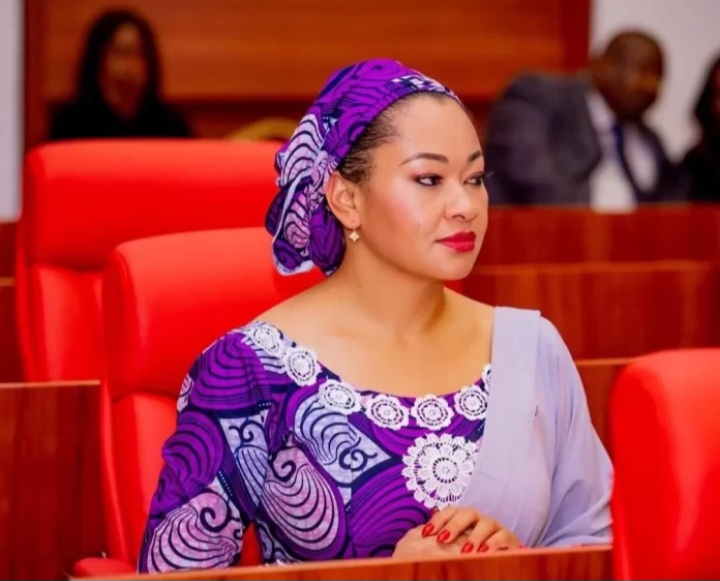The lawmaker representing Kogi Central, Senator Natasha Akpoti-Uduaghan, on Monday, launched a strong legal offensive against the Federal Government, describing the criminal defamation charges filed against her as a brazen act of political persecution and an exhibition of double standard by the Federal Government.
In a preliminary objection seeking the dismissal of the six counts filed against her by the Attorney General of the Federation, the Kogi senator contended that while the Federal Government was quick to file charges against her based on the complaint of the Senate President, Godswill Akpabio, the same government ignored her own earlier petitions against Akpabio.
The charges, filed under the Cybercrimes (Prohibition, Prevention, etc.) (Amendment) Act, 2024, were brought following petitions by Akpabio and ex-Kogi State governor, Yahaya Bello, over remarks she allegedly made during a public address and a television interview.
READ ALSO:
PSG Star Ousmane Dembele Wins 2025 Men’s Ballon d’Or Award
French Media Company Canal+ Completes Takeover Of Multichoice
‘Finidi, Amokachi, Okocha,’ List Of Nigerians Who Made The Ballon d’Or Shortlist
CSO Asks Tinubu To Halt Allocations To Zamfara Over Gov Lawal’s Alleged Bandit Ties
Her arraignment on June 20 drew national attention, with many opposition figures alleging that the case was politically motivated.
She was granted bail on self-recognition after pleading not guilty.
The case, marked FHC/ABJ/CR/195/2025, is being prosecuted by the Director of Public Prosecution of the Federation, Mohammed Abubakar.
In her defence on Monday, Akpoti-Uduaghan filed preliminary objections before both the High Court of the Federal Capital Territory and the Federal High Court, challenging the jurisdiction of the courts and insisting that the Attorney-General of the Federation has no locus standi to prosecute what she described as a private defamation case.
Her legal team, led by four Senior Advocates of Nigeria—Prof. Roland Otaru (SAN); Dr. E. West-Idahosa (SAN); J.J. Usman (SAN); and M.J. Numa (SAN)—argued that the charges were “unconstitutional, frivolous, and designed to intimidate opposition voices.”
The defence further submitted exhibits showing that her comments fell within the ambit of public discourse and media commentary, noting that prosecuting her statements as crimes was inconsistent with democratic norms.
Her lawyers maintained that: “Defamation matters are inherently civil in nature and that attempting to criminalise them constitutes intimidation, suppresses free speech, and represents a misuse of the criminal justice system.”
Akpoti-Uduaghan also accused the authorities of selective justice, alleging that while her petitions over threats to her life by the complainants were ignored, the same institutions hastily filed charges against her.
She contends that the disparity represents a violation of her constitutional rights, “particularly Section 42, and represents discriminatory prosecution because of my opposition political affiliation.”
The charges centre on her claim that Akpabio allegedly instructed Bello to have her killed in Kogi State—a statement she reportedly made at a public gathering in Ihima on April 4, 2025, and later repeated during a television interview.
Prosecutors say the remarks were false, malicious, and capable of inciting violence, endangering lives, and breaching public order.
Her defence team has urged the courts to dismiss the charges at the preliminary stage, warning that allowing the matter to proceed would not only waste taxpayers’ resources but also undermine the credibility of the justice system.
Her strong pushback comes just hours after the Federal High Court in Abuja adjourned the matter to October 20, following an objection raised by her counsel, Ehiogie West-Idahosa (SAN).
Meanwhile, a coalition of women’s rights organisations has taken the standoff between Akpoti-Uduaghan and the Senate to the United Nations, accusing Senate leadership of gender-based discrimination.
In a formal complaint submitted on Monday to UN Special Rapporteur on Violence Against Women and Girls, Reem Alsalem, the Womanifesto Network—representing more than 350 organisations—argued that the Senate’s actions breach Nigeria’s obligations under the Convention on the Elimination of All Forms of Discrimination Against Women which the country ratified in 1985.
“This is about the integrity of our democracy. If a senator can be silenced for reporting harassment, what hope do ordinary women have?” asked the group’s convener, Dr. Abiola Akiyode-Afolabi.
The complaint urges the UN to pressure Nigeria’s government and the Senate to comply with a Federal High Court ruling by reinstating Akpoti-Uduaghan immediately, and to establish an impartial investigation into her harassment claim.
Signatories to the petition include Amnesty International Nigeria, FIDA Nigeria, Baobab for Women’s Human Rights, Women in Management, Business and Public Service (WIMBIZ), and Stand to End Rape.
The activists warned that the Senate’s refusal to comply with the court order sends a dangerous signal to women in politics.
“This case shows that sexual harassment in politics isn’t just a personal violation—it’s a threat to women’s participation in governance,” the petition states.
As of press time, the UN Special Rapporteur’s office had not yet responded.
Akpoti-Uduaghan went public on February 20 with allegations that Senate President Godswill Akpabio harassed her—claims Akpabio has strongly denied. Days later, the Senate’s Ethics and Privileges Committee recommended a six-month suspension, citing breaches of parliamentary procedure.
The suspension stripped her of salary, security, and access to the chamber, drawing outrage from civil society groups who said the punishment was retaliatory and disproportionate.
On July 4, the Federal High Court in Abuja ruled the suspension unconstitutional and ordered her reinstatement. But the Senate has blocked her return, arguing that the judgment contained no binding reinstatement order and remains “under litigation.”
PUNCH

